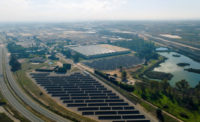MUNICH—The BMW Group is sourcing aluminum produced using solar electricity.
The automaker has set a goal of lowering CO2 emissions in its supplier network by 20 percent by 2030. Since producing aluminum is highly energy-intensive, the use of green power, such as solar electricity, offers considerable potential for reducing CO2 emissions. By purchasing aluminum produced with green power, BMW can avoid approximately 2.5 million ton of CO2 emissions over the next 10 years. This is equivalent to about 3 percent of the CO2 targets the company has set for its supplier network.
“We aspire to lead the way in sustainability and implement our sustainability goals in a systematic manner. We will be able to meet over 50 percent of our CO2 targets for the supplier network, just by using green power. The use of solar electricity for producing aluminum is a major step in this direction,” says Andreas Wendt, BMW’s manager for purchasing and supplier network.
The “solar aluminum” will be shipped to BMW’s light-metal foundry in Landshut, Germany, where it will be turned into body and drive train components. The solar aluminum will meet nearly half of the foundry’s annual consumption.
As electric vehicles grow in popularity, aluminum will become increasingly important as a lightweight material. However, producing aluminum is extremely energy-intensive. Generating the electricity needed to produce primary aluminum is responsible for about 60 percent of the global aluminum industry’s greenhouse gas emissions.
BMW’s solar aluminum is being produced by Emirates Global Aluminum (EGA), the first company in the world to use solar electricity for commercial production of aluminum. The electricity to power EGA’s plant comes from the Mohammed Bin Rashid Al Maktoum Solar Park in the desert outside of Dubai, the world’s largest solar energy facility.
“We are delighted to have the BMW Group as our first customer for low-carbon CelestiAL aluminum from EGA,” says Abdulnasser Bin Kalban, CEO of EGA. “Aluminum is light, strong and infinitely recyclable. That is why it plays such an important role in the development of a more sustainable society and in making modern life possible. But how sustainably the aluminum is produced is also important. Solar aluminum is a step in the right direction. It uses a natural and abundant source of energy in our desert environment to produce a metal that is vital to the future of our planet.”
The Landshut foundry is BMW’s only European manufacturing facility for light metal casting. In 2020, the facility’s 1,600 employees produced 2.9 million cast components, including cylinder heads, crankcases, components for electric drive trains, and large-scale structural components for vehicle bodies.
The factory uses five casting methods to produce components. In some cases, sand cores are produced using inorganic binders, making the casting process virtually emission-free.





